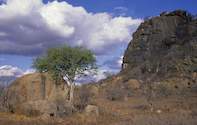
Hans Hoheisen Facility Rejuvenated
Distinguished doctors from dozens of destinations are due to descend on Hans Hoheisen Wildlife Research Facility near Orpen Gate in due course. On 8 April 2005, the facility will be re-launched as the International Centre of Excellence in Biodiversity, Research and Information (COE).
This launch is a partnership between the Peace Parks Foundation and the Limpopo Department of Economic Development, Environment and Tourism. Together they will facilitate research into a variety of biodiversity issues, forming an international research centre for SADC (Southern African Development Community).
It is the culmination of 18 months of talks between the two organisations. The first priority for the COE will be veterinary studies into various diseases that currently threaten wildlife populations, along with their related impacts on humans and domestic livestock. This is especially important in light of the fact that fences in the Great Limpopo Transfrontier Park (GLTP) have already been dropped, despite different disease monitoring protocols in South Africa, Mozambique and Zimbabwe.
As time progresses, scientists from other environmental disciplines will be attracted to the facility to carry out research from this prime location. These include taxonomy, ethnobotany and ecology. Geographical Information Systems (GIS) will form a part of the work performed at the institute. According to Dr Cobus Raath, chief consulting veterinarian to the Peace Parks Foundation, the COE will "bring together experts to do research at the highest possible level".
As part of the process to attract scientists, the somewhat neglected facility has been given a facelift through painting and roof repairs. Further work, scheduled to be carried out within the next year, will include the construction of a research village. This will incorporate 10-15 self-catering units for researchers from Africa, America, Europe and East Asia. The researchers will stay in these units while conducting their research.
Extra laboratories and extensions to the existing office buildings are also on the cards. A five-year plan for the research priorities will be drawn up, and a research manager will be appointed to oversee the various projects. Jacques Dommisse, corporate manager of Peace Parks, says that by having all the research people together on the ground at the COE, synergies will develop to the benefit of all the programmes.
Dommisse says that one of Peace Parks' development areas is the training of wildlife managers. This has led to the foundation funding the Southern African Wildlife College, which is just over 10km from Hans Hoheisen. He said that this means that the two facilities will be able to share certain resources, such as vehicles. This was another advantage to locating the COE at Hans Hoheisen.
Hans Hoheisen History
The Hans Hoheisen Wildlife Research Facility was officially opened in July 1983 with the intention of stimulating wildlife research in the Lowveld. It is located on a 37ha property donated by benefactor Hans Hoheisen, who owned about 15,000ha of land next to the Kruger National Park.
The Limpopo Department of Economic Development, Environment and Tourism, and its preceding government equivalents, has facilitated over a hundred research projects, with the Hans Hoheisen facility playing a major role as a Lowveld research base. It is in a prime location as it has infrastructure such as electricity, telephones and tar roads, coupled with easy access to major research areas such as the Kruger National Park and surrounding Associated Private Nature Reserves, provincial nature reserves such as Manyeleti and Andover, and a large rural community.
The existing infrastructure includes offices, a library, laboratories, houses for permanent staff and self catering accommodation for students. There is also an 88-seat auditorium. In recent years the facility has been used by both post-graduate and under-graduate students for accommodation and as a research base. Background information and research material has also been sourced from the station.
The Southern African Wildlife College, which receives funding from Peace Parks, also obtains study materials from the station. Other training projects, including field guide training, have utilised the facility.
By Melissa Wray In Greater Kruger National Park

